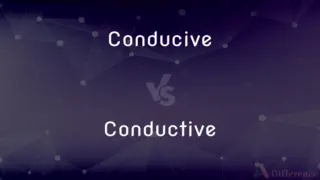Noticeable vs. Obvious — What's the Difference?
By Urooj Arif & Fiza Rafique — Updated on April 27, 2024
Noticeable refers to something that can be easily seen or recognized with some attention, whereas obvious implies that something is so clear or apparent that it can be understood or recognized immediately.

Difference Between Noticeable and Obvious
Table of Contents
ADVERTISEMENT
Key Differences
Noticeable means something is capable of being seen or noticed, often requiring a degree of attention or scrutiny to discern. Whereas, obvious refers to something that is clear and unmistakable, requiring no effort to perceive or understand.
In terms of perception, noticeable characteristics or changes might not be immediately clear and might need a closer look to be appreciated fully. On the other hand, obvious features or differences are instantly recognizable and leave little room for doubt or need for closer examination.
The term noticeable is often used when the qualities or aspects are significant enough to warrant attention but not so prominent that they cannot be overlooked. Conversely, when something is described as obvious, it suggests that it is so apparent that it cannot be missed even with a casual glance.
For example, a noticeable improvement in someone's performance could be seen through detailed analysis of their results over time, whereas an obvious mistake in a report would be clear to anyone reading it, without needing detailed scrutiny.
In communication, pointing out something noticeable might be a way of highlighting something that is not immediately clear to others, whereas stating something obvious could be seen as unnecessary or even condescending, as it implies the information is already clear to everyone.
ADVERTISEMENT
Comparison Chart
Definition
Easily seen with some effort
Clearly apparent, unmistakable
Perception
Requires attention
Instant recognition
Usage Context
Subtle details
Clear, unmistakable elements
Communication Impact
Highlights subtlety
May imply common knowledge
Example
Gradual improvement in skills
A blatant error
Compare with Definitions
Noticeable
Easily seen or detected.
There was a noticeable change in his behavior after the promotion.
Obvious
Not hidden; openly seen.
The sign was in an obvious place.
Noticeable
Significant enough to be observed.
The quality of the picture was noticeably better.
Obvious
Easily perceived or understood.
The answer to the puzzle was obvious.
Noticeable
Clearly perceptible, but not blatant.
Her smile was noticeable even from a distance.
Obvious
Clear or apparent to the mind.
It was obvious she was unhappy.
Noticeable
Worthy of attention.
The decoration was subtle but noticeable.
Obvious
Recognizable without any doubt.
The theme of the story was obvious to everyone.
Noticeable
Markedly evident, requiring some attention.
There’s a noticeable improvement in your writing.
Obvious
Lacking subtlety; straightforward.
His disdain for the idea was obvious.
Noticeable
Easily seen or noticed; clear or apparent
A noticeable increase in staff motivation
Noticeable grey hairs
Obvious
Easily perceived or understood; clear, self-evident, or apparent
Unemployment has been the most obvious cost of the recession
It was obvious a storm was coming in
Noticeable
Evident; observable
Noticeable changes in temperature.
Obvious
Easily perceived or understood; apparent.
Noticeable
Worthy of notice; significant
A noticeable change in the composer's style.
Obvious
Easily seen through because of a lack of subtlety; transparent
An obvious political ploy that fooled no one.
Noticeable
Capable of being seen or noticed.
Obvious
Easily discovered, seen, or understood; self-explanatory.
Noticeable
Worthy of note; significant.
Obvious
Exposed; subject; open; liable.
Noticeable
Capable of being observed; worthy of notice; likely to attract observation; conspicuous.
A noticeable man, with large gray eyes.
Obvious
Easily discovered, seen, or understood; readily perceived by the eye or the intellect; plain; evident; apparent; as, an obvious meaning; an obvious remark.
Apart and easy to be known they lie,Amidst the heap, and obvious to the eye.
Noticeable
Capable or worthy of drawing attention;
Noticeable shadows under her eyes
Noticeable for its vivid historical background
A noticeable lack of friendliness
Obvious
Easily perceived or understood;
Obvious errors
Noticeable
Capable of being detected;
After a noticeable pause the lecturer continued
Obvious
Easily perceived by the senses or grasped by the mind;
A perceptible sense of expectation in the court
An obvious (or palpable) lie
Noticeable
Undesirably noticeable;
The obtrusive behavior of a spoiled child
Equally obtrusive was the graffiti
Obvious
Obvious to the eye or mind;
A tower conspicuous at a great distance
Wore conspicuous neckties
Made herself conspicuous by her exhibitionistic preening
Noticeable
Readily noticed;
A noticeable resemblance
Obvious
Obvious to the eye;
A visible change of expression
Common Curiosities
What does it mean when something is noticeable?
Something is noticeable when it can be seen or recognized with some attention or effort.
How does obvious differ from noticeable?
Obvious implies clarity and ease of recognition, requiring no effort, unlike noticeable, which may require closer examination.
What makes an object noticeable?
Contrast, size, color, or position can make an object noticeable against its surroundings.
Why use the term noticeable instead of obvious?
Noticeable is used to denote subtlety and significance that merits attention, whereas obvious is used for what is immediately clear and undeniable.
How does perception affect what is considered obvious?
Cultural, personal, or situational contexts can influence whether something is perceived as obvious by an individual.
Can something be both noticeable and obvious?
Yes, an aspect can be both noticeable and obvious if it stands out clearly and can be recognized easily.
What kind of attention does something noticeable require?
Something noticeable might require focused attention or a deliberate look to be fully appreciated.
When is it inappropriate to use obvious?
Using "obvious" might be inappropriate or seem dismissive in situations where the clarity of information is subjective or not clear to everyone involved.
Is it redundant to say "very obvious"?
Yes, saying "very obvious" is often redundant because "obvious" alone already conveys clear and unmistakable recognition.
Why might someone fail to notice something noticeable?
Distractions, lack of interest, or focusing on other details can cause someone to overlook something that is otherwise noticeable.
What are examples of obvious facts?
"The sky is blue on a clear day" is an example of an obvious fact that requires no further explanation.
Can something become more noticeable over time?
Yes, as one becomes more familiar with a context or details, certain elements may become more noticeable.
Share Your Discovery

Previous Comparison
Conducive vs. Conductive
Next Comparison
Horde vs. HoardAuthor Spotlight
Written by
Urooj ArifUrooj is a skilled content writer at Ask Difference, known for her exceptional ability to simplify complex topics into engaging and informative content. With a passion for research and a flair for clear, concise writing, she consistently delivers articles that resonate with our diverse audience.
Co-written by
Fiza RafiqueFiza Rafique is a skilled content writer at AskDifference.com, where she meticulously refines and enhances written pieces. Drawing from her vast editorial expertise, Fiza ensures clarity, accuracy, and precision in every article. Passionate about language, she continually seeks to elevate the quality of content for readers worldwide.
















































